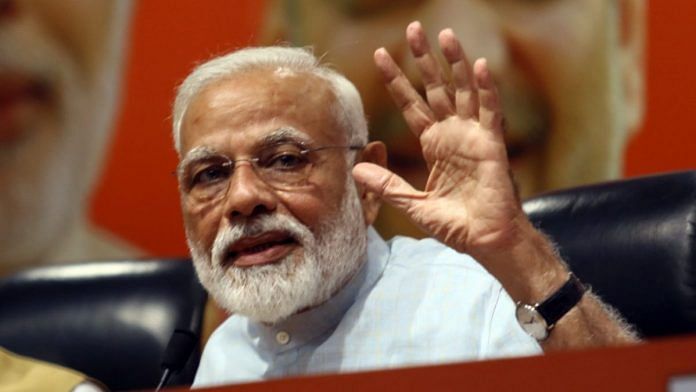New Delhi: The Modi government may have centered its poll pitch around national security but intelligence reports suggest Left-wing extremism in the country is on the rise, notwithstanding the regime’s claims of pushing it back.
The Maoists are regrouping mainly in four areas —Chhattisgarh, Bihar, Jharkhand and Maharashtra — and recent attacks in Dantewada and Gadchiroli were manifestations of the same, an intelligence source told ThePrint.
On 9 April, just two days before the first phase of election began, Bharatiya Janata Party (BJP) MLA Bhima Mandavi and four security personnel were killed in a Maoist attack in Chhattisgarh’s Dantewada. Just a few days later, the Maoists struck again in Maharashtra’s Gadchiroli, where 15 security personnel were killed in an IED blast.
“The cadres are not just regrouping but also shifting their base. They are believed to be working on new strategies and these recent attacks were to announce their revival,” said the intelligence source.
“They are bouncing back,” added the source.
Also read: Lok Sabha results Live: BJP sweeps Jharkhand, as per early trends
The developments come in the wake of outgoing Home Minister Rajnath Singh’s claims last year that the issue of Left-wing extremism would be completely eradicated in the country in three years. Speaking at a CRPF camp, Singh had said that the districts affected by Naxal violence in the country came down to about 10-12 as compared to 126 earlier.
The latest intelligence reports have been shared with the security agencies and the forces including the Central Reserved Police Force (CRPF), said the source.
Change in leadership
According to a second intelligence source, the regrouping in the four states is happening as a part of a “revival plan” charted out by the new leadership under the aegis of Basawnath Nambala Keshav Rao, general secretary of the central committee of the banned Communist Party of India (Maoist).
“In December last year, G.S. Ganapathy, who held the post for 25 years was replaced by Keshav Rao, who is an expert in jungle warfare and has been involved in many attacks on security forces,” said the second source.
“The intel inputs suggest that Keshav Rao is working on regrouping the cadres, selecting young leaders to revive activities in Chhattisgarh, Maharashtra, Telangana, Andhra Pradesh, Odisha, Jharkhand and Bihar,” added the source.
Release of Mishra in Bihar
As part of the revival plans, the CPI(Maoist)’s unit in Bihar is reviving the extremist ideology in the state after former chief Pramod Mishra’s release, said a third intelligence source.
Mishra, who was the CPI(Maoist) politburo head and had over 22 cases registered against him, was arrested in May 2008 and released in August 2017.
“Mishra was earlier in jail but after his release, there are inputs of him getting back in action and getting his unit together,” the second source said.
Sudhakaran’s surrender, coal projects in Jharkhand
Even in Jharkhand, the new developments suggest a Maoist resurgence in the region.
In the last two months, with the Amrapali-Magadh coalfield project in full swing, intel inputs say state-run Central Coalfields Ltd (CCL) officials and transporters have been meeting a CPI(Maoists) wing, the Tritiya Prastuti Committee (TPC), to discuss how to pay “levy”.
In October 2018, a National Investigation Agency (NIA) team cracked had down upon Maoist funding in the state. Fifteen teams of the NIA, assisted by Jharkhand Police, carried out searches at the residences and offices of managers of different companies associated with purchase and transport of coal in Amrapali-Magadh coalfields for their alleged role in providing funds to the TPC.
The NIA had said that it found incriminating evidence against one CCL employee Subhan Miran for allegedly organising meetings between top leaders of TPC, CCL and village committees members of Amrapali-Magadh coalfields.
“Now there are reports of several meetings being conducted and money on the move because of the ongoing coal project,” the second source said.
The source added that the surrender of B. Sudhakar, one of the central committee and politburo members of the CPI(Maoist), who controlled several districts of Jharkhand — including Palamu, Garhwa, Latehar, Lohardaga, Gumla and Simdega, collectively called Koyal Sankh Zone — was a setback for the Maoists.
But after Mithlesh Singh Mahto alias Duryodhan took over, the operations revamped.
Also read: Kashmiri CRPF officer who died in hunt for Maoists always led from the front
An alternate base
After a crackdown by security forces, including the CRPF, in several regions of the four states, the cadres are now said to be moving their base, in search for an alternative.
According to the first source, the intelligence agencies have noticed a movement of these cadres to the southwestern region from Chhattisgarh.
“Inputs are that Madhya Pradesh, Maharashtra and Chhattisgarh (MMC) cadres are working to create an alternate base. The Kerala, Karnataka and Tamil Nadu (KKT) cadres too are working to create an alternate base,” the source said.
“The movements of these cadres are being tracked closely. However, it is still unclear where they plan to set up a base,” added the source.




Poor journalism. With stories like these, the print is helping Indian security forces to spread terror across the northeast. Stories like these lead to human rights abuse because it gives the police a reason to harass people in the name of so-called national security. It’s nothing but bad journalism done at the behest of serving the people in power and also impressing the management of the print. The reporter wants to show she’s working while cooking up stories at home,
There is some grim news from Depchok in Ladakh as well, major construction activity by the Chinese. One hopes the new government will do all the good things it is planning in its first year. Events, dear boy, events tend to catch up very fast with even the most successful administrations.